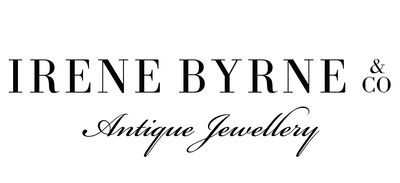1920s Australian Ruby and Diamond 'Moi et Toi' Ring
Irene Byrne & Co








We currently have this sweet circa 1920s ‘Moi et Toi’ ruby and diamond ring. The 0.43ct round cut natural ruby, is claw set with an 0.43ct old European cut diamond, in a handmade mount of 18ct yellow gold, and marked by maker Mackay & Co, Australia.
Circa: 1920s
Jeweller: Mackay & Co
Origin: Australian
Gemstone: Ruby and Diamond
Carat: Ruby = 0.45ct, measuring 4.30 mm diameter
Cut: Round Ruby and Old European Cut Diamond
Colour: H
Clarity: SI
Material: 18ct White on 18ct Yellow Gold
Band: 1.70 mm band
Handmade Setting
The 1920s
Gone were the empire gowns of the Edwardian Era and in came the shorter, more free flowing flapper dresses with their dropped waists and flirty intentions. As a result the jewellery changed to compliment the latest fashion trends. While old cut gems were still being used, yellow gold was being fazed out and white gold and platinum were taking over the jewellery industry creating long necklaces with tassels on the end (satouirs), line bracelets and elongated earrings to stand out against short cropped hair. Rings were perfectly symmetrical and often featured contrasting stones which really added to the whole new look of the “Jazz Age”.
Circa: 1920s
Jeweller: Mackay & Co
Origin: Australian
Gemstone: Ruby and Diamond
Carat: Ruby = 0.45ct, measuring 4.30 mm diameter
Cut: Round Ruby and Old European Cut Diamond
Colour: H
Clarity: SI
Material: 18ct White on 18ct Yellow Gold
Band: 1.70 mm band
Handmade Setting
The 1920s
Gone were the empire gowns of the Edwardian Era and in came the shorter, more free flowing flapper dresses with their dropped waists and flirty intentions. As a result the jewellery changed to compliment the latest fashion trends. While old cut gems were still being used, yellow gold was being fazed out and white gold and platinum were taking over the jewellery industry creating long necklaces with tassels on the end (satouirs), line bracelets and elongated earrings to stand out against short cropped hair. Rings were perfectly symmetrical and often featured contrasting stones which really added to the whole new look of the “Jazz Age”.
